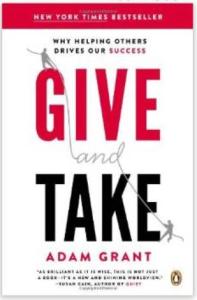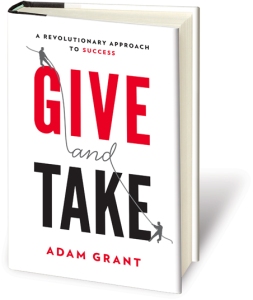 Today we start a series of blog posts on Skills for Young Professionals. The focus of this series is the best-selling and provocative book by Adam Grant, Give and Take: Why Helping Others Drives Our Success. We’ll cover one chapter per blog post. For those desiring an overview before embarking on the series, I recommend, “How to Read a Book like Adam Grant’s ‘Give and Take,” by Ryan Quinn.
Today we start a series of blog posts on Skills for Young Professionals. The focus of this series is the best-selling and provocative book by Adam Grant, Give and Take: Why Helping Others Drives Our Success. We’ll cover one chapter per blog post. For those desiring an overview before embarking on the series, I recommend, “How to Read a Book like Adam Grant’s ‘Give and Take,” by Ryan Quinn.
First a word about the author, Adam Grant. I personally don’t know the man. All I know of him can be found on his LinkedIn profile. His B.A. is from Harvard, received in 2003. His M.A. and Ph.D. are from UMichigan, received in 2006. 8.5 years later he has received numerous teaching and research publication awards, received fast promotions to Associate Professor and then Full Professor, and has written a best selling book. His rise has been meteoric.
He classifies a person’s approach to relationships as giver, taker or matcher. Giver and taker are opposites, a matcher is somewhere between. I have no clue as to whether Grant is a giver or taker. From what I can gather from his profile, he might be a giver as a teaching professor (a conclusion based on his receipt of teaching awards), and a taker with regards to his research and publishing efforts (a conclusion based on his exhaustive list of awards received).
A focus on the approach to interactions with other people.
Early on, Grant writes,
“According to conventional wisdom, highly successful people have three things in common: motivation, ability and opportunity. If we want to succeed, we need a combination of hard work, talent and luck. [We should add] a fourth ingredient, one that’s critical but often neglected: Success depends on how we approach our interactions with other people.” (p. 4)
A giver is defined by Grant as “other focused, paying more attention to what other people need from (him/her).” A taker is defined as:
“They like to get more than they give. They tilt reciprocity in their own favor, putting their own interests above others’ needs. Takers believe the world is a competitive, dog-eat-dog place. They feel that to succeed, they need to be better than others. To prove their competence, they self-promote and receive plenty of credit for their efforts.” (p. 4)
Matchers strive
“…. to preserve an equal balance of giving and getting. Matchers operate on the principle of fairness: when they help others, they protect themselves by seeking reciprocity. If you’re a matcher, you believe in tit for tat, and your relationships are governed by equal exchanges of favors.
Hmm. At Christmas time in the United States, it is frequently said that it is better to give than receive. Christians profess belief in the Golden Rule, you should treat others as you would have them treat you. But in the basic human makeup, pride runs amok. We are all self-centered to some degree.
Grant says that most people in most countries admire a giver approach to interpersonal relationships. He says that in family and close friend relationships, more people are givers than takers. However, in the business world, a giver is perceived as weak and naive.
Grant cites evidence that over the long run, some people who approach interpersonal relationships as a giver experience more success (not defined at this time) than those who are takers or matchers. Curiously, some givers experience less success than either takers or matchers. So there must be a way to be a successful giver.
Also, Grant says that in the fast paced modern business world with instant communications and social media, rewards from being a giver can be realized much more quickly than in decades past. In other words, conditions seem to be ripe to adopt a philosophy of being a giver.
Grant has three aims, or purposes in his book. First, observers tend to underestimate the amount of success experienced by givers. Second, to dispel myths about givers possessing undesirable personality traits. “Successful givers are every bit as ambitious as takers and matchers. They simply have a different way of pursuing their goals. Third, to show that a giving approach is not a zero sum game. “Givers succeed in a way that creates a ripple effect, enhancing the success of others around them.”
Discussion Questions
Do you know Adam Grant? What is he like? Is he a giver, matcher or taker?
Have you thought about what is your approach to interpersonal relationships? Based on the definitions provided, are you a giver, matcher or taker? Do you wish you were otherwise?
I wish my approach to interpersonal relationships was that of a giver. I admire the approach, and I think it is a better approach to use in business. However, I have a lot of pride, and I am quick to self-promote and “toot my own horn.”
In the business world, is it better to be a giver, matcher or taker?
For years I’ve been writing and lecturing on the desirability of being other-focused instead of being self-focused. I’m convinced that the benefits touted by Grant are real and attainable.
Are conditions changing so that the scales are tipping away from taking to giving?
I absolutely believe that conditions are changing to the point that being a giver is a much sounder approach to becoming successful.
For you, what was the most important revelation in the chapter?
Please respond to these questions in the comment section below.
We’ll cover chapter 2 on Monday, March 2.
by David Albrecht, Ph.D.
Want more of Skills For Young Professionals? Sign up to receive e-mail notification of posts.
Please follow me on Twitter (@profalbrecht), and follow or connect to me on LinkedIn.



